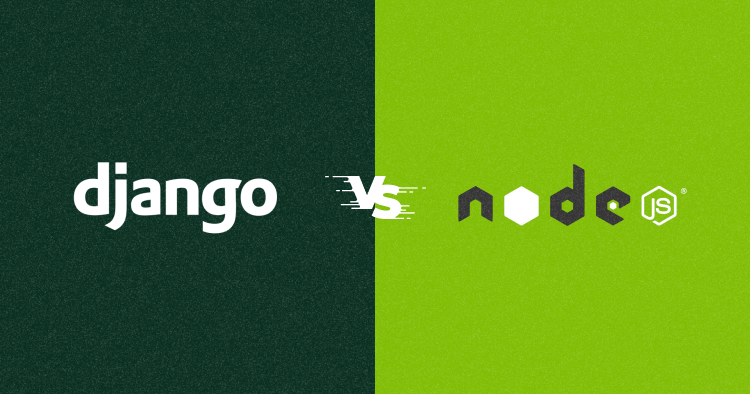
Disclaimer: This is a guest blog submitted by Omu Inetimi
Choosing the right framework for web development can be a head-scratcher, especially with options like Django and Node.js in the mix.
Django, built with Python, offers an all-in-one toolbox for easy and fast web application development. On the other hand, Node.js, leveraging JavaScript, excels in real-time updates and efficient multitasking on the server side.
Which one should you choose?
In this blog, we’ll break down Django vs. Node.js on key factors: performance, developer experience, ecosystem, use cases, and job market trends.
Let’s get started.
Overview of Django and Node.js
Let’s start by looking closely at Django and Node.js to understand what makes each tick.
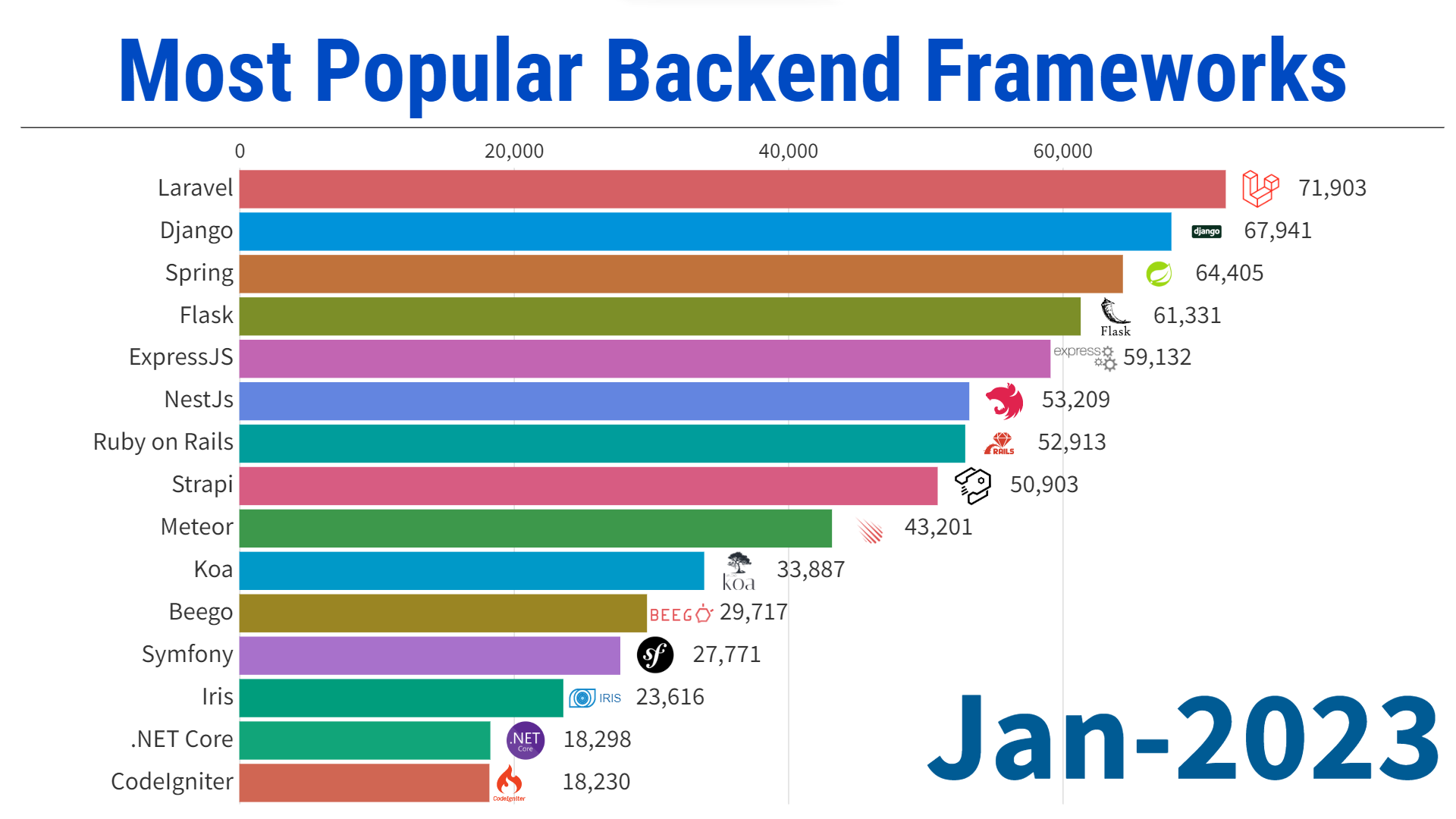
Django
Think of Django as a robust toolbox in the Python family. Known for its simplicity, it comes with a plethora of out-of-the-box features, including email handling, user management, and database connectivity.
This eliminates the need to build everything from scratch, making it ideal for speedy development of web applications like databases, online stores, or news websites.
Django adopts the ‘Model-View-Template’ pattern, streamlining code organisation. With excellent security features, it minimises worries about common mistakes leading to security issues.
Also read: How to Install NPM Based Projects on Cloudways
Supercharge your Django or Node.js projects with Cloudways Cloud Hosting
With Cloudways cloud hosting for developers, unlock the power of SSD hosting, optimized stacks, dedicated firewalls, and much more.
Django Usage Statistics
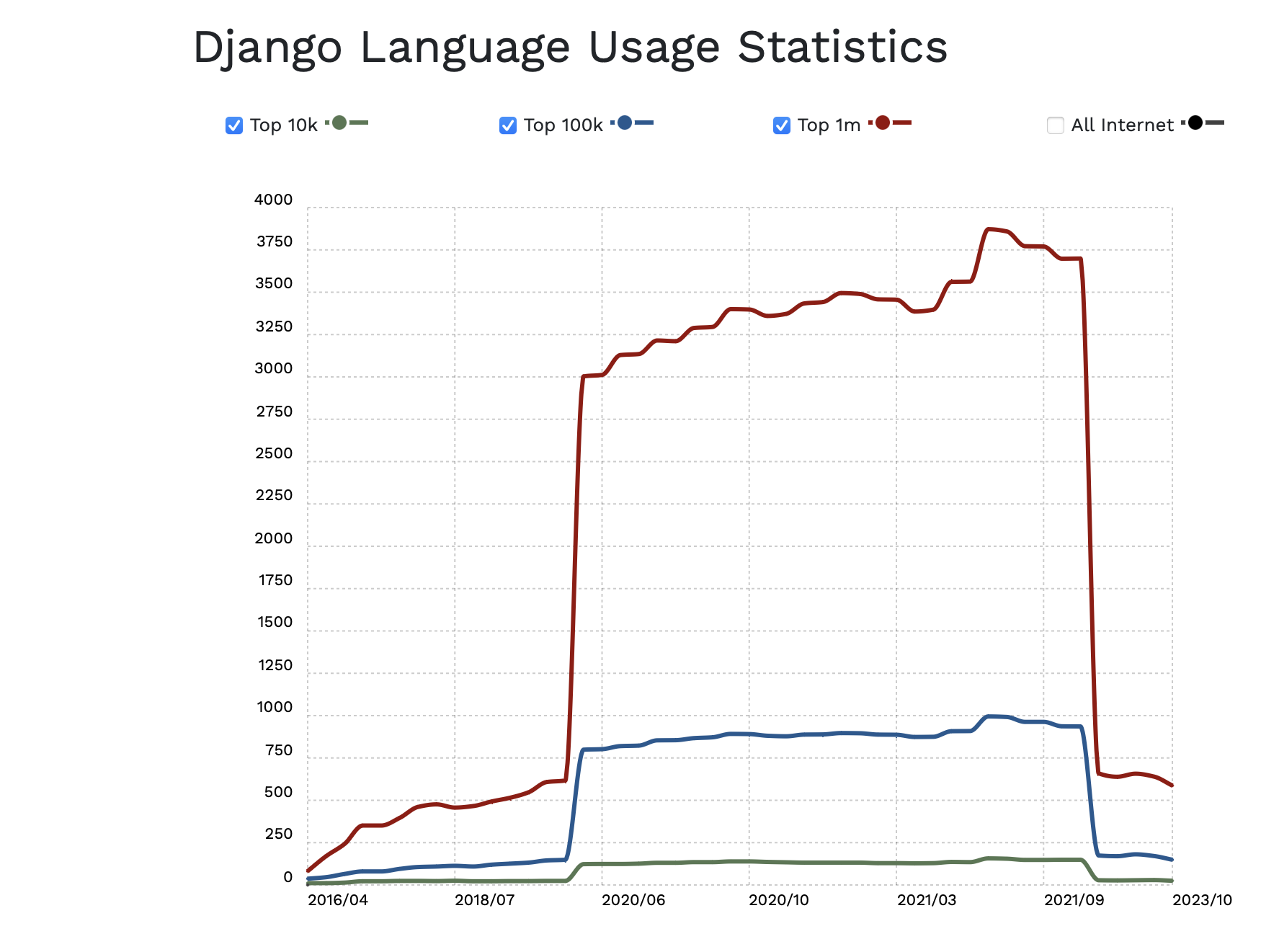
Node.js
Contrasting Django, Node.js revolves around JavaScript – usually a browser language. It effortlessly handles server-side tasks, offering a versatile tool that smoothly adapts to web-related operations.
Node.js shines in handling large numbers of users concurrently, thanks to its “event-driven architecture.” This means it can smoothly manage multiple simultaneous events without scalability hiccups. Ideal for applications like chat rooms, real-time news feeds, or any scenario dealing with rapidly changing data.
Node.js also comes with npm, a package manager that allows you to access various tools and functionalities. It’s like a toolbox for your project, giving you the flexibility to pick and choose what suits your application.
Node.js Usage Statistics
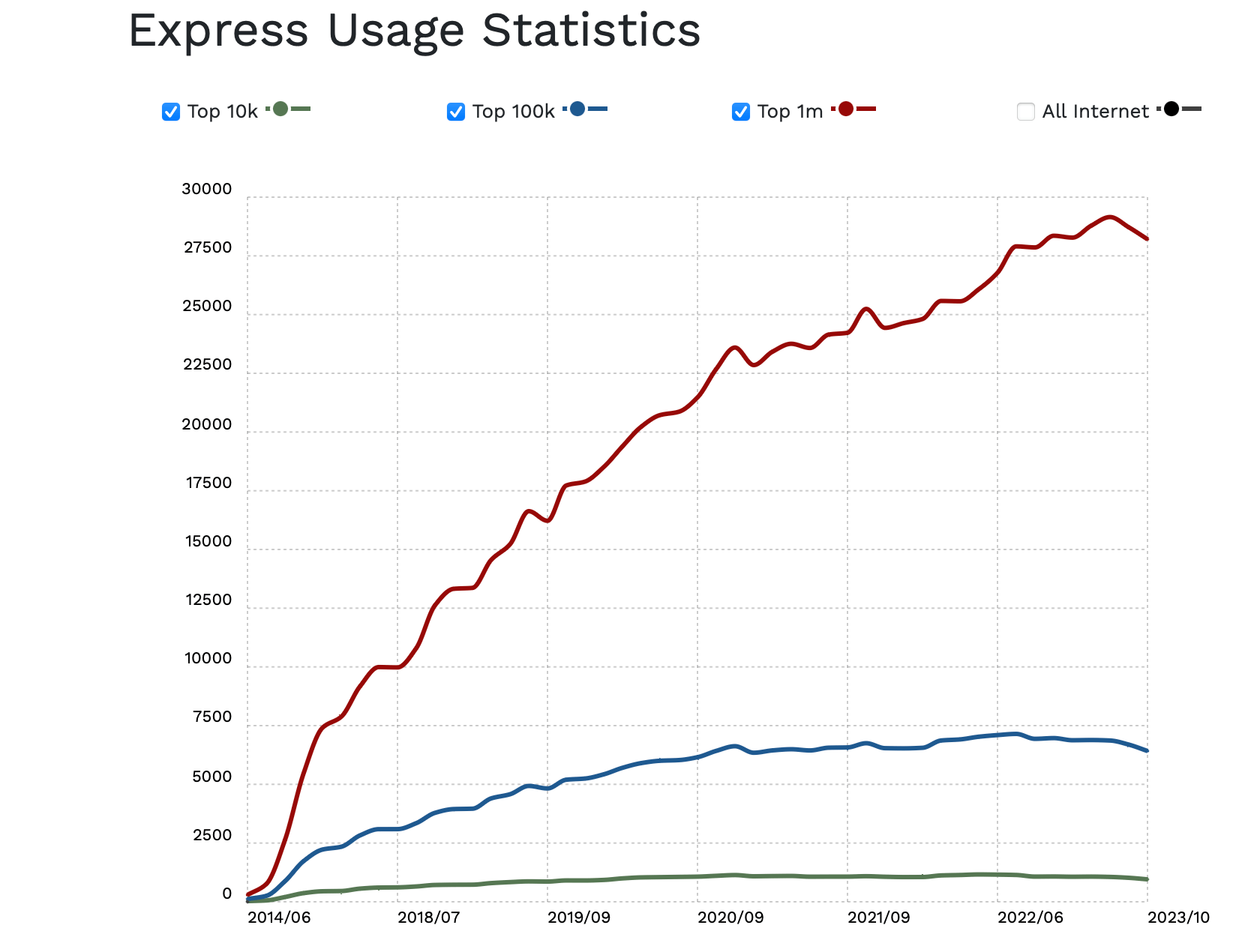
There you have it: Node.js and Django. While Node.js is a flexible multitasker that works well for real-time applications and managing large user counts, Django is more akin to a ready-to-use toolkit ideal for creating standard web apps.
You will understand why they are both favourites in the web development community as we delve deeper into what each can do.
Performance and Scalability
When it comes to performance and scalability in web development, both Django and Node.js have proven their mettle, each powering some of the largest and most dynamic web applications out there.
Django’s Performance and Scalability
Django is known for its ability to handle complex, data-driven websites efficiently. Here are some key points:
- Robust Data Handling: Ideal for applications that involve heavy database interactions and content management.
- High Traffic Management: Proven ability to manage high user traffic smoothly.
- Security and Reliability: Offers strong security features, making it a trustworthy choice for handling sensitive user data.
Examples of Usage:

Instagram, boasting 1 billion monthly users, employs Django for its backend. Tailored for efficiency, Django manages the colossal content scale, encompassing photos, videos, and stories, with millions of new posts daily.

Pinterest, with 450 million monthly users, relies on Django for efficient content management. Handling billions of pins and boards, Django supports a dynamic content repository and a large user base seamlessly.

The Washington Post relies on Django for efficient content management, handling articles, images, and videos seamlessly. Its adoption speaks to Django’s reliability in managing heavy traffic and content-rich applications securely.
Node.js’s Performance and Scalability
Node.js is praised for its scalability and real-time capabilities. Important details consist of:
- Real-Time Data Processing: This technology excels at managing data in real-time, which makes it perfect for real-time updates and chat applications.
- Managing Concurrent Connections: Handles several concurrent user interactions with efficiency.
- Scalability: The ability to maintain responsiveness and performance even as the user base and data grow.
Examples of Usage:
LinkedIn, with 774 million users, employs Node.js for mobile backend services. Handling real-time data and high traffic, Node.js is instrumental in managing network connections and delivering timely updates to user feeds, messages, and notifications.


PayPal relies on Node.js for secure and swift processing of millions of daily transactions. The shift to Node.js has notably enhanced the performance and scalability of PayPal’s applications.
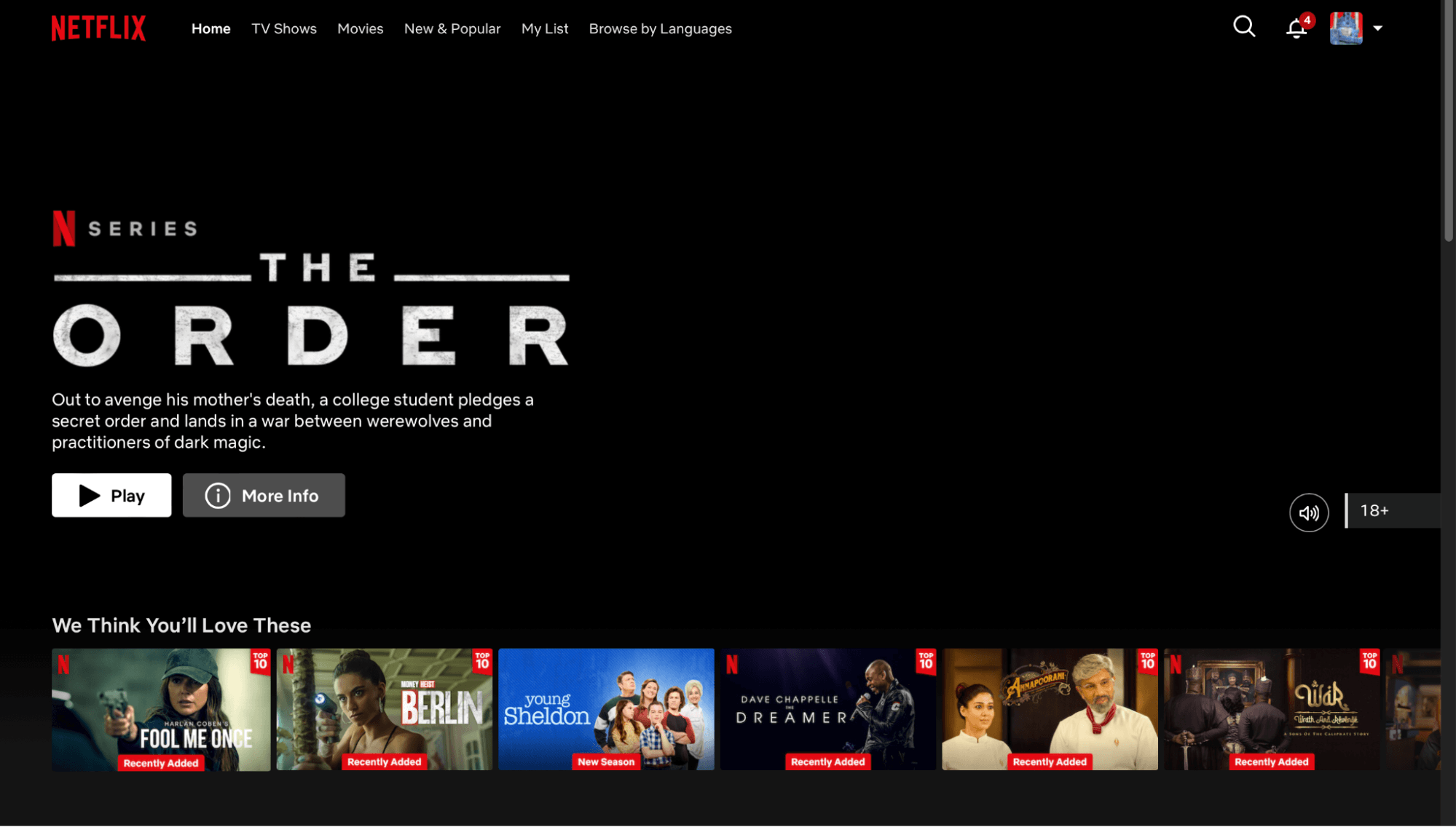
Netflix, with 200+ million subscribers, relies on Node.js for fast, lightweight, and scalable streaming services. It efficiently handles user requests, personalises experiences, and delivers smooth content to a global audience.
Summary
When deciding between Django and Node.js, consider your project’s requirements. Django, used by Instagram and The Washington Post, is great for secure data and content management. On the other hand, Node.js, favoured by Netflix and LinkedIn, is better suited for real-time data processing and scalability under heavy traffic. Each framework has demonstrated its value in handling the demands of extensive web applications.
Also read: How to Use Node Modules on Cloudways
Developer Experience and Learning Curve
Knowing the developer’s experience and learning curve is essential when selecting a web development framework.
Let’s examine how these features compare between Django and Node.js, considering how user-friendly both are for novices and how supportive the community is.
Django: Developer Experience and Learning Curve
Django is often praised for its straightforward approach, making it a friendly choice for beginners. Here are some points to consider:
- Ease of Use: Django’s structured approach and clear documentation make it comparatively simple for beginners to get started.
- Complete Package: Developers can use most tools right away thanks to the ‘batteries-included’ philosophy, which minimises the need for third-party plugin integration.
- Community Support: A robust and helpful community featuring many third-party packages, tutorials, and forums.
- Learning Resources: There are a lot of resources available, such as community tutorials, online courses, and official documentation.
- Perfect for: Beginner web developers or those who want a more structured, ready-to-use solution.
Node.js: Developer Experience and Learning Curve
Node.js, being JavaScript-based, offers a different experience. Here’s what to expect:
- Knowledge of JavaScript: Node.js is a logical progression for individuals who are already proficient in JavaScript, as it permits the utilisation of a single language for both front-end and back-end development.
- Asynchronous programming presents an event-driven, non-blocking input/output paradigm that can be difficult for novices to understand but has advantages in terms of performance.
- Large-scale NPM Registry: A vast array of packages available in the npm registry, offering solutions for nearly all requirements.
- Society and Assets: A lively community with many resources, such as developer forums, online tutorials, and comprehensive documentation.
- Perfect for: Developers comfortable with asynchronous programming and JavaScript, especially those aiming to build data-intensive real-time applications.
Summary
In summary, Django provides a guided approach, perfect for novices and those seeking feature-rich functionality. Meanwhile, Node.js, with its asynchronous nature, is ideal for JavaScript-savvy developers aiming at highly scalable, real-time applications. Both frameworks benefit from strong communities, offering valuable support throughout the learning process.
Elevate your Django or Node.js site’s performance with Cloudways Managed Cloud Hosting
Experience a fully optimized stack, advanced cache, and CDN. Enjoy 24/7 support, robust security, and unbeatable value for your web projects.
Ecosystem and Integration Capabilities
Exploring the ecosystems and integration capabilities of Django and Node.js is like looking into their toolkits and seeing how well they play with other technologies. Both have their unique strengths and offerings.
Django’s Ecosystem and Integration
Because of its strong and well-integrated ecosystem, Django is a dependable option for various projects. Here’s a sample:
- Rich Feature Set: Django eliminates the need for external plugins by providing many features for common web development tasks.
- Power of Python: As a member of the Python ecosystem, it has access to many libraries and tools, particularly in fields such as machine learning and data analysis.
- Third-Party Packages: Django’s functionality can be further expanded with many third-party packages.
- Database Support: Django offers integrated support for popular databases, guaranteeing smooth data handling and integration.
- Admin Interface: One of the best features of Django is its admin interface, which makes site administration activities easier.
Node.js’s Ecosystem and Integration
Node.js provide an ecosystem that is distinct but no less fascinating, emphasising flexibility and modularity.
- Huge npm Registry: There are a ton of modules and packages available for almost any need in Node.js’s enormous npm registry.
- Flexible and Modular: Its architecture makes it simple to integrate with a wide range of tools and services, which greatly increases its adaptability to various project requirements.
- Real-Time Capabilities: Node.js works incredibly well with WebSockets and other technologies to create real-time applications.
- Cross-Platform Development: It facilitates cross-platform development, which makes creating and managing apps for multiple platforms simpler.
- Community Contributions: The Node.js community continuously adds new tools and updates to its ever-expanding ecosystem.
Summary
To cut things short, Django suits developers valuing a standardised approach with powerful database and admin capabilities, leveraging extensive out-of-the-box features and Python’s strength. On the other hand, Node.js stands out for adaptability, a rich npm registry, and the ability to craft scalable, real-time applications.
Your choice depends on project specifics and whether you prefer a modular, build-as-you-go approach or a more integrated package.
Use Cases and Suitability
When deciding between Django and Node.js, it’s crucial to consider what kind of projects each is best suited for. Both frameworks excel in different scenarios, and understanding these can help guide your choice.
Django: Ideal for Data-Driven Projects
Django is especially useful for specific kinds of online applications. Here are some important scenarios:
- Content Management Systems (CMS): Django is a great framework for creating CMSs because of its structured nature and admin interface.
- E-commerce Sites: Its security features and robustness make it appropriate for e-commerce platforms that handle sensitive user data and transactions.
- Data Analysis and Reporting Tools: Django’s powerful data capabilities make it a perfect fit for applications that require data crunching and reporting.
- Educational Platforms and Large Databases: Django’s capacity to manage complex data models and high traffic makes it a good choice for educational sites and large databases.
Node.js: A Go-To for Real-Time Applications
When high concurrency and real-time data processing are required, Node.js excels. Common use cases include:
- Chat Apps: Its real-time features are ideal for creating scalable and effective chat apps.
- Streaming Services: Node.js is well-suited for applications such as video streaming platforms because it can manage data streaming efficiently.
- Single-Page Applications (SPAs): It’s perfect for SPAs that need dynamic updates because it can manage asynchronous requests.
- APIs for Web and Mobile Applications: It is a good option to develop backend APIs that provide data to web or mobile applications because of its lightweight and fast nature.
Summary
So, in summary, Django is a powerhouse for data-driven, content-heavy projects emphasising admin capabilities and security. Conversely, Node.js shines in high scalability, non-blocking, event-driven architecture, and real-time processing.
It will mostly depend on the particular needs and objectives of your project and which framework is a better fit.
Job Market and Industry Demand
The job market trends for Django and Node.js skills offer insights into their industry demand and what these trends mean for developers looking to specialise in one of these frameworks. Let’s explore how each framework stands in the current job market.
Django: Steady Demand in Certain Sectors
Django’s job market presence is influenced by its specific use cases and the popularity of Python. Here are some key points:
- Preferred in Certain Industries: Django is often favoured in sectors like journalism, e-commerce, and education, where its robustness and security features are highly valued.
- Python’s Rising Popularity: With Python’s growth in data science and machine learning, Django developers can find opportunities in data-driven fields.
- Stable Demand: There is a consistent demand for Django developers, especially in companies that value the framework’s scalability and reliability for large-scale applications.
Node.js: High Demand in Modern Web Development
Node.js’s versatility and performance have made it highly sought after in the job market. Some observations include:
- Preferred for Real-Time Applications: Companies focusing on real-time applications, such as chat services, streaming platforms, and SPAs, often seek Node.js expertise.
- Growing in Startups and Tech Companies: Many startups and tech companies prefer Node.js for its scalability and efficiency, particularly in developing modern web and mobile applications.
- Versatility Attracts Opportunities: Node.js developers may find broader opportunities given the framework’s adaptability and use in various applications.
Summary
To sum up, align your choice between Django and Node.js with your career goals. Django offers stability in sectors valuing structure and Python analytics. Node.js, which is in high demand for modern applications, provides diverse opportunities, especially in real-time processing and scalability projects. Consider market trends to guide your career path.
Final Verdict
As we wrap up our comparison between Django and Node.js, it’s clear that each framework brings its own strengths and considerations to the table.
Both frameworks are supported by active communities and have a wealth of resources available, ensuring support and guidance regardless of your choice.
The choice between the two depends on various factors, including the nature of your project, your team’s expertise, and your specific development needs.
In the end, before you get started with Cloudways, I highly suggest checking out our guide on which web applications can be hosted on Cloudways.
Q1. Is Django full stack or backend?
Django is a full-stack framework that supports both front-end and back-end development.
Q2. Which is more in demand: NodeJS or Django?
Node.js is often preferred for real-time applications and APIs, while Django is suitable for rapid development and data-driven applications.
Q3. Should I learn NodeJS or Django for a job in 3 months?
Both Node.js and Django have job opportunities, but the choice depends on your career goals and the type of projects you want to work on.
Q4. Is Node harder than Django?
While Node.js is less complicated than Django in terms of complexity, the choice depends on your experience with JavaScript and project requirements.
Q5. Can Django replace NodeJS?
No, Django can’t replace Node.js; they serve different purposes, with Node.js offering more flexibility for certain app features.
Author’s Bio
 |
Omu Inetimi is a software engineer specializing in Python and Django. Known for developing robust backend solutions, he balances technical expertise with clear communication. Outside of work, Omu plays chess and engages in startups and building the future. |
Abdul Rehman
Abdul is a tech-savvy, coffee-fueled, and creatively driven marketer who loves keeping up with the latest software updates and tech gadgets. He’s also a skilled technical writer who can explain complex concepts simply for a broad audience. Abdul enjoys sharing his knowledge of the Cloud industry through user manuals, documentation, and blog posts.